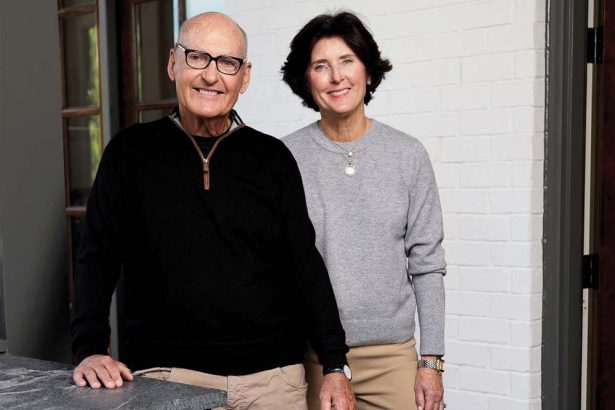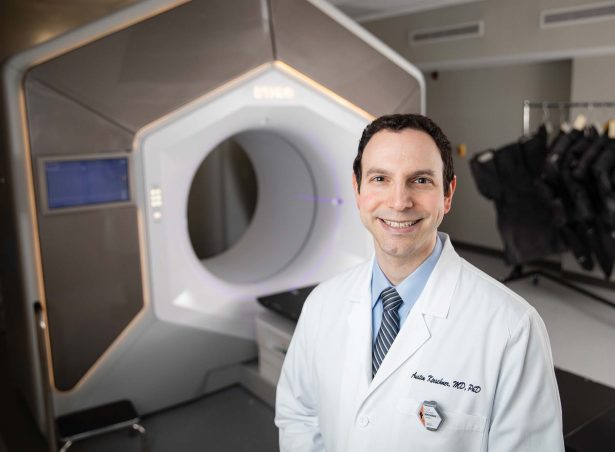On the Ball
“I’m engaged with cancer, but I’m not defined by it,” says former Big Ten commissioner Jim Delany.
November 30, 2023 | Danny Bonvissuto

This summer, Jim Delany took the Queen Mary 2 from New York City to Southampton, England, with his brother, spent three days in London, four days in the Dordogne region of France and two days in Paris. He returned to Nashville just in time for his second infusion of PluvictoTM, a radioactive drug therapy targeted to a molecule on the surface of prostate cancer cells.
“I’ve never felt sick, but if they tell you you’re sick, I guess you’re sick,” said Delany, who has metastatic prostate cancer. “Some people are very sick at stage 4. Other people are just not sick, and I am happily one of those people. By definition I have stage 4, but the therapies have been helpful in warding off advancement. It’s measured. It’s managed. Then I just go off and do what I do.”
That includes a daily workout, at least one trip to the dog park with his 3-year-old labradoodle, Jeb — who Delany called “one of the top five dogs in Davidson County” — and a lot of time on the phone. In 2020 when he retired as commissioner of the Big Ten Conference after 30 years, Delany, 75, started a consulting business at the intersection of media, college sports and crisis. Current clients include the Orange Bowl, the Rose Bowl and the Big Ten Conference.
When he was diagnosed in 2019, Delany and his wife, Kitty, who lived in Hinsdale, Illinois, at the time, had already decided to return to Nashville, where they met at a charity tennis tournament in the early ’80s. After he had a radical prostatectomy in October 2019 at Northwestern Memorial Hospital and then relocated to Nashville in January 2020, his care team connected him with David Penson, MD, MPH, the Paul V. Hamilton M.D. and Virginia E. Howd Professor of Urologic Oncology and professor and chair, Department of Urology at Vanderbilt University Medical Center (VUMC).
Penson set Delany up with a multidisciplinary prostate cancer care team at Vanderbilt- Ingram Cancer Center.
Throughout hormone therapy, external beam radiation therapy and the PluvictoTM infusions, the Delanys were impressed with the collaboration among doctors and were inspired to contribute to metastatic prostate cancer research at VUMC.
“I’m mostly concerned about making things good for myself and the overall community that’s impacted by metastatic prostate cancer,” he said. “It was an easy decision: We want to be helpful. We’re not going to turn it all around on our own, but that doesn’t mean you can’t make a contribution.”
According to Penson, it’s critical that prostate cancer survivors — particularly ones who are as well known as Delany — share their stories and support prostate cancer research.
“Prostate cancer is still the most common cancer among American men — and when it becomes metastatic, we still don’t have a cure,” said Penson, who is a Big Ten parent and enjoys talking sports with Delany. “Thanks to the support of people like Jim and Kitty, we’ve come a long way in the last decade with many new treatments to control the disease, but it’s only with continued support that we will finally find a cure for this cancer.”
Helping Those Who Need it Most
Long before cancer affected him personally, Delany learned how important it is to fund research when he helped promote the Big Ten Cancer Research Consortium, a clinical collaboration of 15 universities working together toward a cure. Today, the gift the Delanys made to VUMC funds a lab run by Paula Hurley, PhD, a scientist who wasn’t aware of her own family history with prostate cancer when she decided to focus on helping cure this disease.

“I’d been looking at cancer very broadly. When it was time to start my own lab, I wanted to focus on a specific type of cancer so I could understand those patients, what they need and how to help them,” Hurley said. “After I started working on prostate cancer, my dad was diagnosed with it. I also found out that my paternal grandmother’s father died of metastatic prostate cancer.”
Hurley uses the Delanys’ donation for a project focused on metastatic prostate cancer patients whose cancer has recurred despite having androgen deprivation therapy, a treatment that reduces the levels of the male hormone (testosterone) to slow prostate cancer growth.
“Broadly these cancers can become resistant in two ways: In one way, the cancer is still dependent on androgen and androgen receptor signaling — but the cancer has found a way to evade the drug by mutating its receptor or synthesizing androgen in a different way,” she said. “Then there’s another mechanism of resistance where the cancer no longer needs the androgen receptor pathway to survive, and so therapies targeting that pathway are not effective. We’re trying to understand these mechanisms of therapy resistance to help us discover new therapies.”
Thanks to the Delanys’ gift, Hurley’s lab doesn’t have to depend on funding solely on the competitive grant market, which allows her to accomplish more in a short period of time. As a scientist working hard to cure a disease that has affected her family, she’s deeply grateful on a personal and professional level.
“It’s meaningful to meet with somebody who truly cares about advancing prostate cancer research” Hurley said. “Every time we talk about this project in the lab, I think about the Delanys and their contribution. Because of that one-on-one connection, I’ll feel forever connected to them.”
The Shadow of Cancer
Delany, who played varsity basketball at the University of North Carolina, including two NCAA Final Four tournaments, knows there are factors he can and can’t control. Throughout his treatments, he focused on the part of his physical health he could control.
“He’s never stopped. He works out once or twice a day, every day, no matter what,” Kitty said. “During radiation and all the therapies, Jim never misses a day.”
After surgery and hormone therapy, Delany “got his body in shape” for rounds of radiation in summer 2020 with Austin Kirschner, MD, PhD, assistant professor of Radiation Oncology, who’s part of Delany’s multidisciplinary care team at Vanderbilt-Ingram.
Kirschner has a front-row seat for the “huge clinical need” for funding metastatic prostate cancer research — and the underappreciated aspects of this disease.

oncologist for Jim Delany. Photo by Erin O. Smith.
“More than 30,000 men annually die from prostate cancer in our country,” said Kirschner, who advocates for regular screenings. “Even though there’s a large number of diagnoses — over 250,000 people are diagnosed with prostate cancer in the United States every year — the vast majority are cured or curable. But there’s still a large group who are unfortunately dying every year from prostate cancer. Most people think it’s localized and can be cured, but there’s still a good chunk of people who are not cured, and we need more help for them.”
Kirschner added that all men live under the threat of prostate cancer, afflicting about 1 in 8 men in a lifetime.
“The longer we live the more likely it is that someone will have it,” he said. “Being so prevalent, it is something near and dear to every man’s heart — and everyone who cares about him.”
Thanks to the care he’s received at Vanderbilt-Ingram, Delany, who calls himself “active, experienced and a little bit reflective,” considers cancer a shadow. There are periods of time when he has to prioritize it and times when it can trail behind him.
“I think having cancer, in any form, whether it’s stage 1 or 4, is a good reason to reflect, but there’s no reason to let it have any more influence on you than is absolutely necessary in terms of living your life,” he said. “I’m taking advantage of the therapies that are there and supporting the therapies of the future. I feel like I’m engaged with cancer, but I’m not defined by it.”
